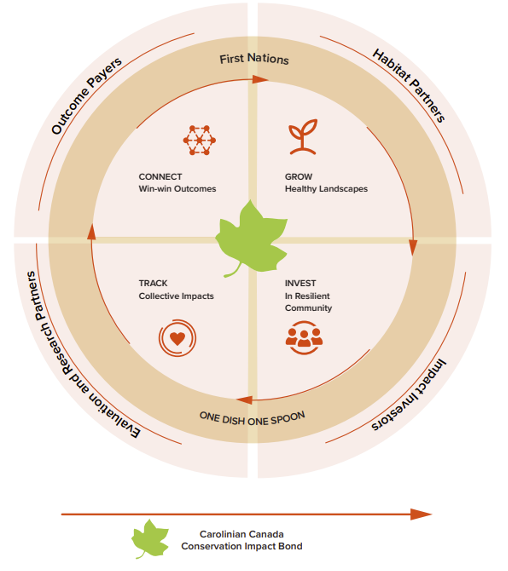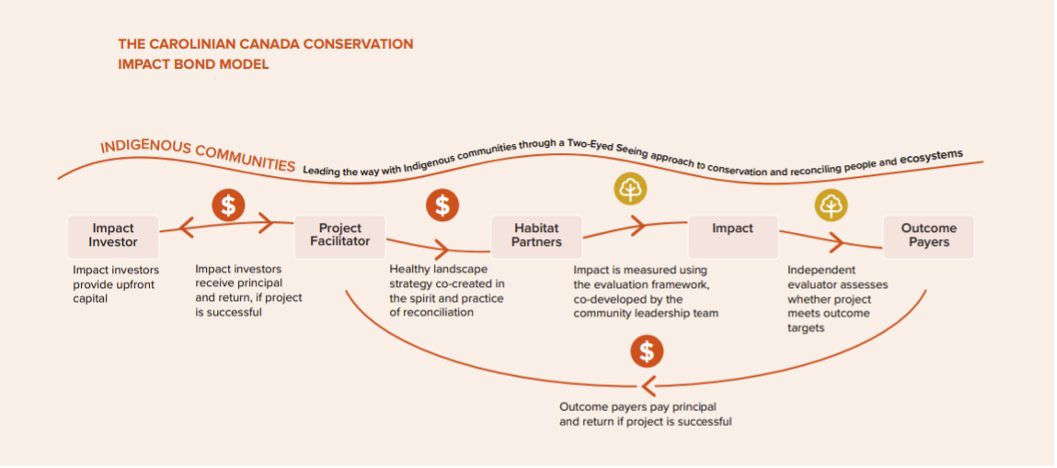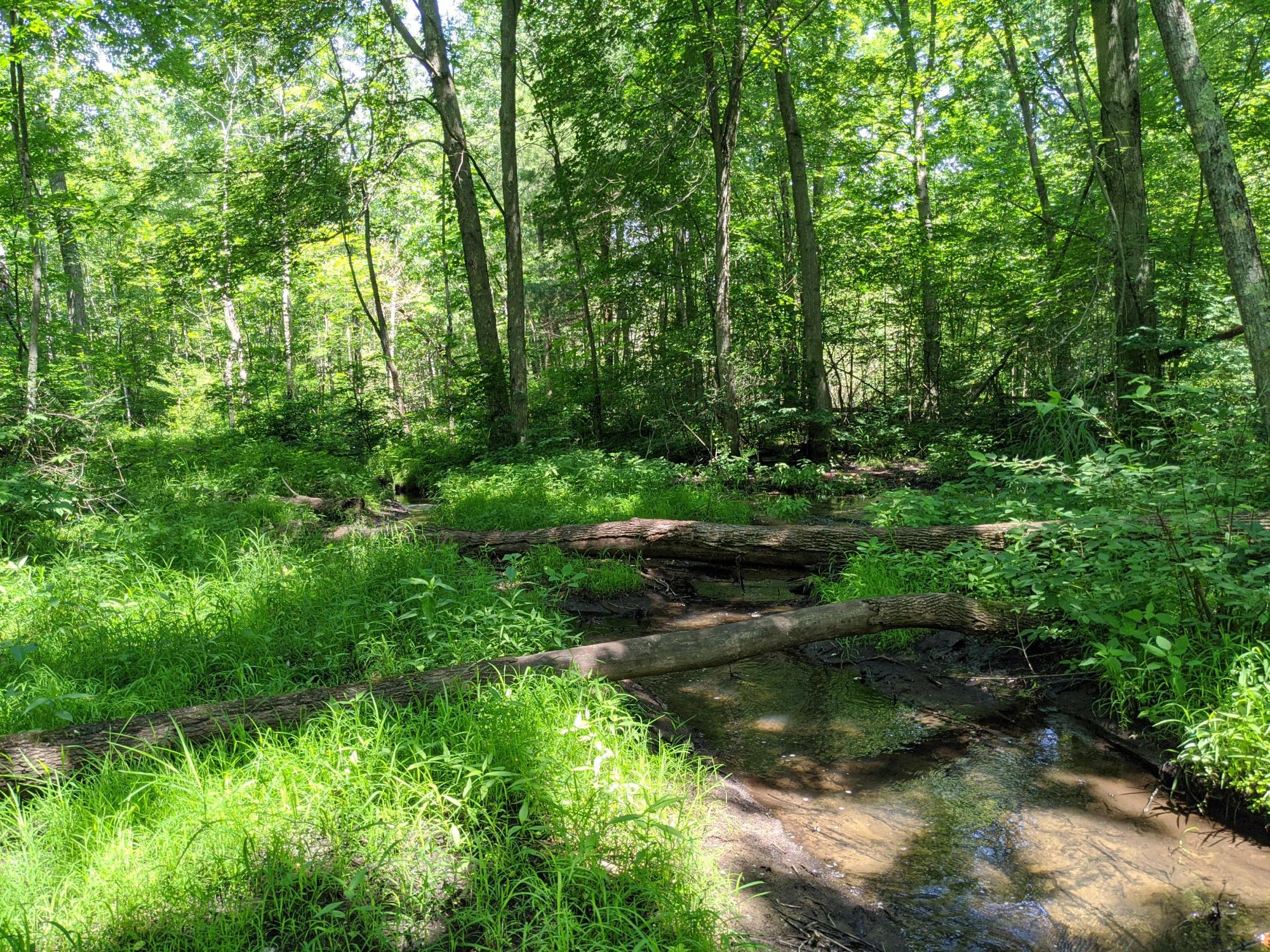About the CIB
The Carolinian Zone, spanning from Toronto to Windsor, is home to 25% of the Canadian population and over 30% of Canada’s species-at-risk. With critical loss of habitat and a landscape fragmented by colonization, current levels of natural habitat fall far short of the minimum required for a healthy resilient landscape.
To address the habitat gaps for a healthy landscape, the Conservation Impact Bond (CIB) is an innovative, pay-for-success model that brings together experts and leaders from different sectors to scale up impact investment for sustainable landscapes.
As an outcome-based conservation finance instrument, groups and individuals can invest for monetary and/or environmental returns that restore resiliency to the land. One of the first of its kind, the CIB is designed to return greater impact beyond the traditional charitable model by enabling more projects to be implemented faster.

The CIB is a solution to address the urgent global call-to-action to meet international 2030 targets for biodiversity and climate resilience with a focus on Canada’s most biodiverse and threatened ecoregion, the Carolinian Zone. The CIB model will continue to scale up across the Carolinian Zone, fast-tracking investment to restore habitat and protect biodiversity.
"Not only has the CIB spectacularly re-imagined the conservation finance space. It is also a leader in ethical restoration and relationship building. What I find most valuable about the CIB, is its dedication to reconciliatory and cross-cultural ways of collaborating with Indigenous communities. The CIB is the shift in the paradigm! " - Filsan Farah, Program Lead at VERGE Captial
How the CIB works
The CIB is activated by collaboration through 3 steps:
- Establishing cross-sector leadership
- Co-creating a healthy landscape portfolio
- Triggering impact investment
The core CIB financial model is based on bringing together entities that place a tangible, monetary value on a service provided by nature and are willing to pay to ensure this service continues (“outcome payers”) with investors willing to invest upfront in these conservation outcomes (“impact investors”).
A healthy landscape portfolio of on-ground projects is co-developed and led by Carolinian Canada’s network of diverse landowners and leaders who protect, steward, and grow healthy habitat (“habitat growers”). They include Indigenous, business, agriculture, and non-profits who have deep local knowledge and experience to support thriving, resilient working landscapes.

Impact investors will receive back their principal plus a monetary return on investment if the agreed upon outcomes from the healthy landscape portfolio are achieved. The pay-for-success model allows outcome payers (e.g., public agencies, foundations, or companies benefiting from sustainability) to achieve environmental and sociocultural benefits while simultaneously decreasing their risk, accelerating action, and driving innovation, efficiency, and effectiveness through the project implementation. This model allows private finance to flow into public-good projects and be rewarded if the program is successful.
"Through finance and innovation, Carolinian Canada's Conservation Impact Bond is creating resilience and trust among key actors who otherwise would not be collaborating together to reverse the trend of habitat loss," said Daniel Fuentes from Carolinian Canada. "This partnership model is both powerful and necessary and offers a place-based approach to a complex challenge."
Coming Together in Ethical Space
It is important to expand ethical and safe spaces in the sector of conservation to foster community bonds and networks, and to strengthen our work together. Carolinian Canada is committed to creating ethical and safe spaces to welcome and ensure the safety of all people in our community.
In our spaces, including the CIB, we prioritize the celebration of Indigenous accomplishments while also acknowledging barriers that exist, systemic and otherwise. We commit to going beyond acknowledgement to work together in ethical space and take action against these barriers to create systemic change through co-creation with the CIB. We will maintain the focus of our conversations on creating better, positive ways forward together. Carolinian Canada is committed to being accountable to the communities we engage with.
Learn more about ethical space at caroliniancanada.ca/safe
Evaluation Framework
The CIB evaluation framework consists of five outcome categories to guide the work toward the shared goals and collectively address the desired impacts. The five outcome categories serve as interconnected evaluation pillars: Connecting Healthy Habitats, Connecting Knowledge / Circling and Learning, Connecting Opportunities, Connecting Our Hearts and Minds, and Connecting Our Bodies. To learn more about evaluation, read the following CIB report here.
CIB Impact
As of April 2023, the CIB is supporting 54 healthy landscape projects across the Carolinian Zone resulting in numerous ecological, sociocultural, and economic benefits including:
- Centering Indigenous goals and communities in land management
- Mobilizing 1.58 million dollars across funders, investors, and outcome payers and accelerating the improvement and resiliency of 269 hectares, including Deshkan Ziibi region and Long Point Walsingham Forest Priority Place
- Supporting local stewards who are growing 40,000 native plants, 825 gardens, and 65 learning spaces
- Supporting 41 jobs and connecting over 1,000 individuals across 20 communities in high quality learning activities, including decolonization training
- Receiving the international Finance for the Future Climate Leader award in 2022
- Supporting a year-long, Indigenous led virtual webinar series, amplifying Indigenous and diverse voices to inspire action and expand ethical space
“The benefits of the bond are incredible; from supporting Indigenous leadership and reconciliation to boosting investment in natural capital to accelerating impact with evidence,” said Adam Spence, CEO of SVX. “The process of developing this bond from the very beginning attests to the collaborative strength of the cross-sectoral partners who took part in this financial innovation.”
About CIB Phase 2: Long Point Walsingham Forest Conservation Impact Bond (LCIB)
The Long Point Walsingham Forest Conservation Impact Bond (LCIB) is the Phase 2 pilot of the Conservation Impact Bond (CIB) model. Following and building upon the success of the Phase 1 pilot (Deshkan Ziibi CIB), the LCIB is accelerating healthy and resilient landscapes in the Long Point Priority Place through private, public and community financing.
The Long Point Priority Place is one of 11 regions across Canada that have been designated as a natural priority place by Environment and Climate Change Canada in 2017, and the only federally designated priority place in Ontario. A priority place is defined as being “an area of high biodiversity value that is seen as a distinct place with a common ecological theme by the people who live and work there.”
“It is exciting to see the expansion of the Conservation Impact Bond into the Long Point Walsingham Forest Priority Place, further validating the uptapped potential of conservation finance here in Canada,” said Diane-Laure Arjalies, Associate Professor, Ivey Business School. “As part of the evaluation team on this project, it is important to note many innovative ideas have been tried over time, but very few actually scale-up, grow and become sustainable. The CIB model has proven it can become a cornerstone solution to driving nature-based conservation.”
LCIB Partners and Funders
At the heart of the CIB are cross-sector partnerships that connect leaders and change-makers representing five key pillars: Indigenous partners, investors, outcome payers, habitat growers, and evaluators.
LCIB Partners and Funders:
CIB facilitators: Carolinian Canada, SVX
Indigenous habitat partners: Kayanase, Indigenous led projects
Habitat partners: Long Point Basin Land Trust, St. Williams Conservation Reserve Community Council, Long Point Region Conservation Authority
Investors: VERGE Capital, Co-operators Community Funds, Oakville Community Foundation, Paul M. Butler
Outcome payers: Environment and Climate Change Canada, Dragonfly Ventures, 3M, Ottercreek Woodworks
Evaluators: Ivey Business School at Western University
“Dragonfly Ventures is honoured to be one of the partners of the LCIB,” said the Dragonfly Ventures Team. “We chose to participate as an outcome payer in celebration of our relationship with the land of this region which served as the home for our founder for many years. As an outcome payer, we appreciate engaging alongside all of the partners that bring their unique skills, experience, and perspectives to supporting the health and well being of this region. We are especially grateful that this work is grounded by a commitment to reconciliation and informed by the deep wisdom of the Indigenous people and communities that have called this region home since time immemorial.”
Healthy Landscape Portfolio
To reach habitat goals, the LCIB’s habitat portfolio includes multiple projects selected to have high impact and deliver on 4 healthy landscape actions: Save, Steward, Seed, and Lead. The LCIB habitat partners have achieved these actions through:
- Saving older growth Carolinian forest and swamp in Stackhouse Forest Sanctuary with an opportunity to protect an ecologically significant natural area with the Long Point Basin Land Trust.
- Stewarding climate-adaptive seed orchards with St. Williams Conservation Reserve to support a restoration economy, protected habitat, and genetic diversity.
- Seeding retired agricultural lands to secure long term protection and stewardship of habitat with Long Point Region Conservation Authority to increase resiliency of working landscapes with local landowners.
- Leading the way with an Indigenous led project to create space for Indigenous youth and healing gardens, and to support land-based learning, economic reconciliation, and Indigenous led opportunities.
"The support provided through the Conservation Impact Bond has enabled Long Point Basin Land Trust to protect and care for the Stackhouse Forest Sanctuary, which contains 50 acres of pristine woodland and a provincially significant wetland,” said Rick Levick, Executive Director, Long Point Basin Land Trust. “We are proud to be working with partners across different sectors to collectively achieve impactful conservation goals here in the Carolinian Region."

The “Stepping Stones” site on the St. Williams Conservation Reserve shows a disturbed conifer plantation landscape that is being restored through the LCIB back to its historical state as an Oak Savanna ecosystem, a globally threated habitat type that supports rare species and species at risk.

Pictured is the Stackhouse Forest Sanctuary, one of the LCIB habitat sites containing 50 acres of land protected by Long Point Basin Land Trust that contains older-growth Carolinian forest and swamp wetlands that support a variety of wildlife. Photo credit: Pat Deacon
----
About the Partners
About Carolinian Canada
Carolinian Canada is a network of leaders growing a green future with healthy landscapes in the spirit and practice of reconciliation. Together we save wildlife, water and way of life for thriving, resilient communities. Find your place. CarolinianCanada.ca/cib
About Kayanase
Kayanase supports and promotes the health and well-being of Mother Earth using a Two Eyed seeing approach through the production of Carolinian native plants via source-identified seeds, the restoration and conservation of damaged ecosystems, and to foster stewardship of the land for future generations.
About Long Point Basin Land Trust
Long Point Basin Land Trust, a charitable non-government organization, was founded in 1996 with a mission to protect and restore functioning ecosystems in the central Carolinian Region. This is accomplished through land ownership, land management and nature stewardship. LPBLT currently protects thirteen nature reserves, totaling 843 acres. The Land Trust’s Explore the Outdoors program provide opportunities for people to connect with nature through hands-on outdoor experiences.
About St. Williams Conservation Reserve Community Council
The St. Williams Conservation Reserve Community Council was established in 2007 to ensure that local community values are represented during the management of the 1034-hectare protected area. The Community Council works closely with Ontario Parks to restore and maintain the threatened Oak Savanna and Carolinian Forest ecosystems. SWCRCC volunteers and contractors undertake habitat restoration and stewardship activities to advance the recovery of the many Species at Risk that depend on the Conservation Reserve. Public access is supported with a network of designated trails to encourage interaction while providing protection where needed. swcr.ca
About 3M
At 3M, we apply science in collaborative ways to improve lives daily. With $32 billion in sales, our employees connect with customers all around the world. Established in 1951, 3M Canada was one of the first international subsidiaries opened by 3M with the head office and original manufacturing site in London, Ontario where approximately 800 of the company's 1,900 employees work. Learn more about 3M's creative solutions to the world's problems at www.3M.ca or on Twitter @3M_Canada.
About VERGE Capital
VERGE Capital supports local economies and communities across Southwestern Ontario by investing in social enterprises that put people and planet first.
About Co-operators Community Funds
Established in 1995, Co-operators Community Funds (CCF) seek to foster resilient, healthy and sustainable communities. Through grant-related activities, over $9.8 million has been disbursed to charitable, non-profit and co-operative organizations whose programming enables underserved youth and individuals with mental health challenges to progress along their path to employability. Additionally, CCF’s invested assets are generating positive social and environmental benefits through impact investments, transition investments and smaller-scale community impact investments. Together, these investments represent approximately 74% of CCF’s investment portfolio. Find more information about Co-operators Community Funds.
About Oakville Community Foundation
The Oakville Community Foundation is a local charitable solutions provider, delivering the tools to realize your charitable passions. The Foundation acts as a philanthropic medium, investing donations to generate new money for our community. We conduct local research to provide our diverse donors with knowledge and solutions to make an impact in the local community, both today and in the future. Thanks to the visionaries in our community who started The Foundation more than 25 years ago, The Foundation has granted more than $59 million to support charities locally and beyond.
About Dragonfly Ventures
Dragonfly Ventures is a family office based in Toronto, Ontario that invests in the unique gifts and capacities of people and communities committed to the health of humanity and our planet. Using a creative, holistic, and mission-centred approach, Dragonfly Ventures uses financial and non-financial tools including private investments, charitable giving, public equity screening, shareholder engagement, and thoughtful collaboration to achieve its vision. Its work is informed by a deep commitment to address racial and gender inequity together with reducing the impact of toxics on the health of our planet and bodies, lifting up local, sustainable food systems, and efforts that contribute to climate resilience, land and soil health, and freshwater conservation. To learn more visit, dragonflyventures.ca
https://www.dragonflyventures.ca/
About the Ivey Business School, Western University
For 100 years the Ivey Business School (www.ivey.ca) at Western University is Canada’s leading provider of relevant, innovative and comprehensive business education. Drawing on extensive research and business experience, Ivey faculty provides the best classroom experience, equipping graduates with the skills and capabilities they need to tackle the leadership challenges in today’s complex business world. Ivey offers world-renowned undergraduate and graduate degree programs, as well as Executive Education at campuses in London (Ontario), Toronto and Hong Kong.
